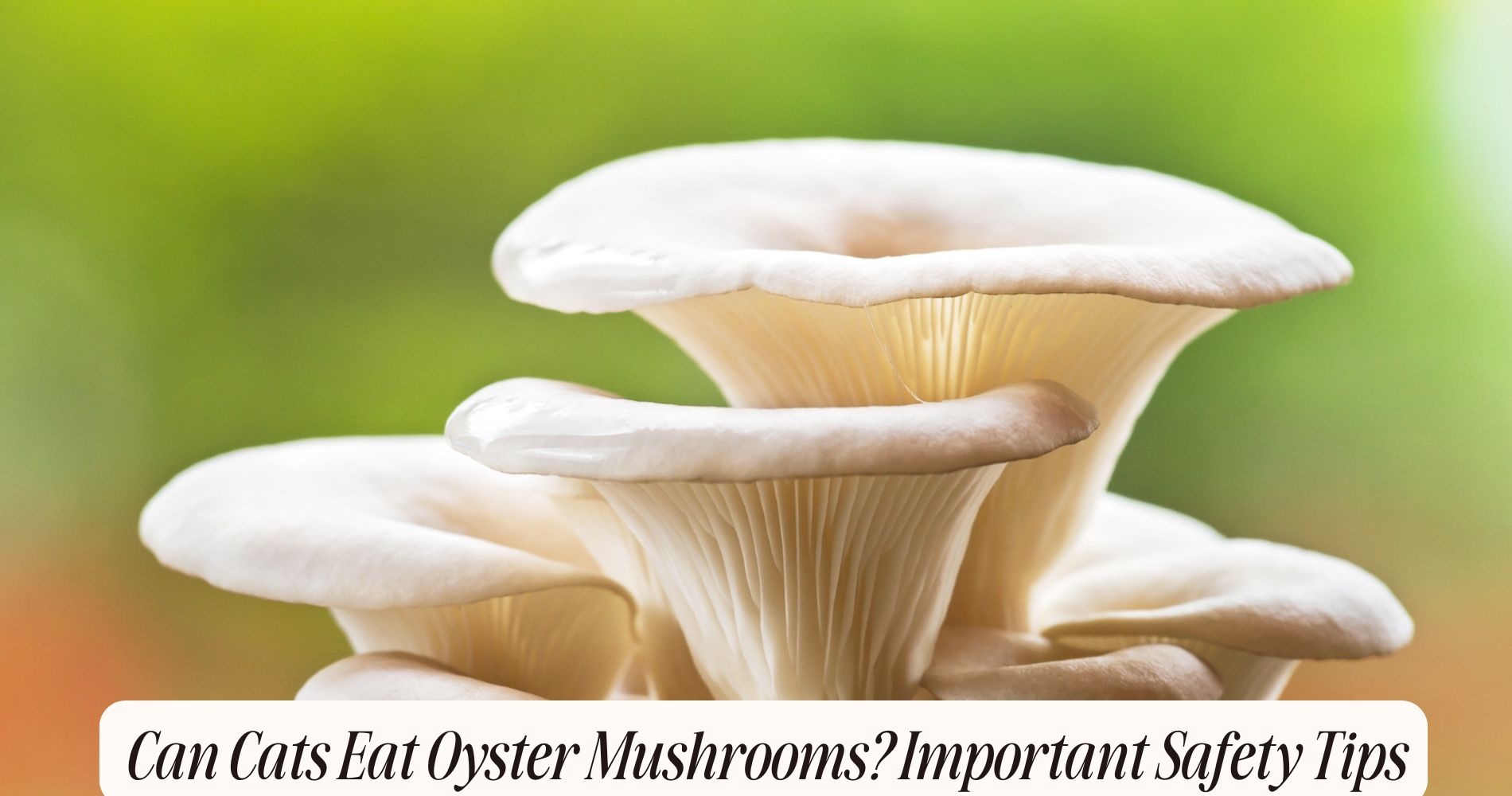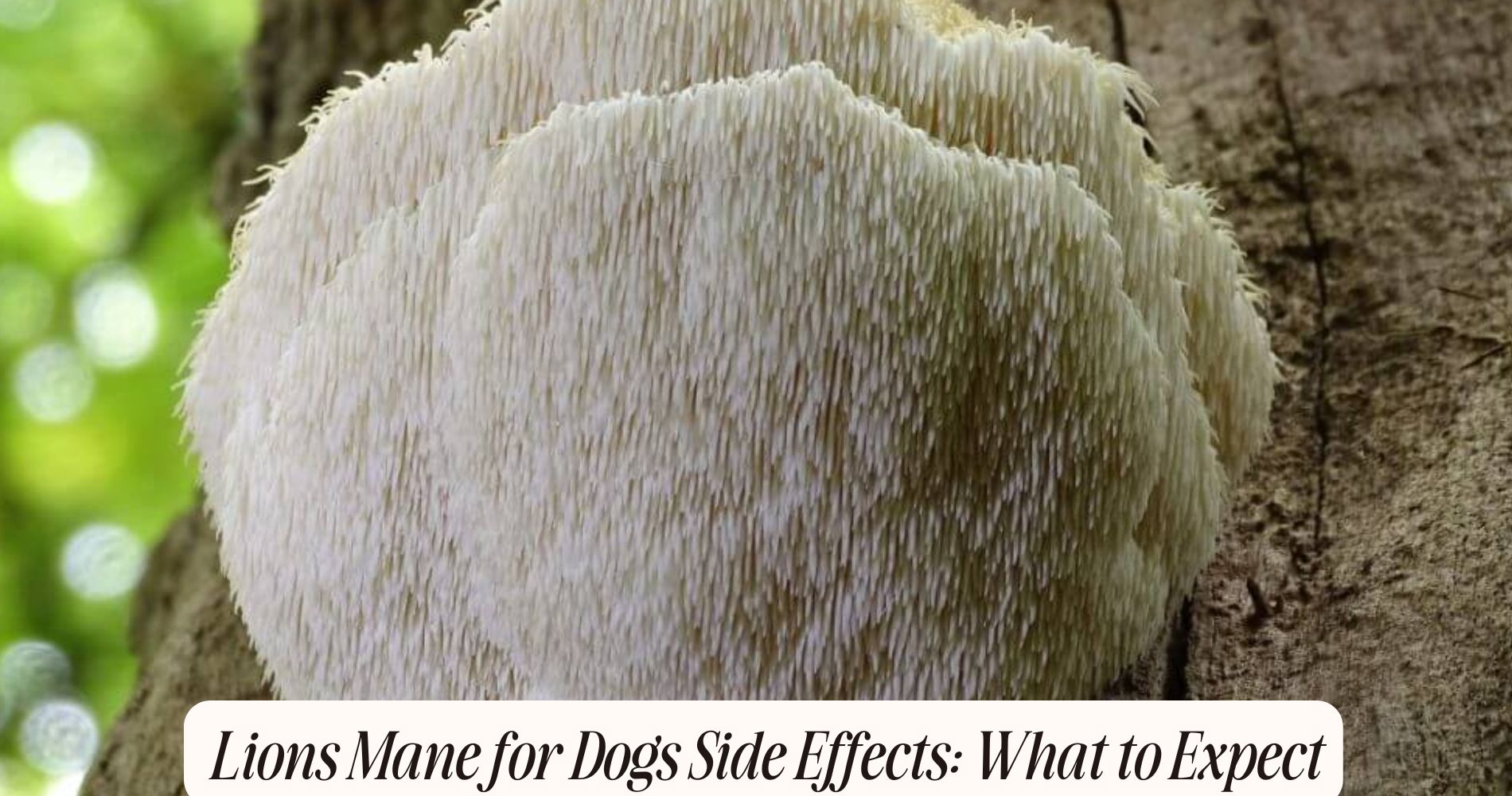
Can Cats Eat Oyster Mushrooms? Important Safety Tips
Can cats eat oyster mushrooms? Yes, cats can eat oyster mushrooms, but you should do so with caution. While they're generally non-toxic, these mushrooms lack essential nutrients for your feline. It's best to serve cooked oyster mushrooms in moderation—about a teaspoon once a week. Always monitor your cat for any signs of digestive upset, like vomiting or diarrhea, after introducing these treats. Remember, cats are obligate carnivores, so mushrooms should only be a small part of their diet. If you're curious about preparing them safely and exploring alternative treats, there's plenty more to discover regarding feline nutrition.
Understanding Oyster Mushrooms
Oyster mushrooms, with their delicate, fan-shaped caps and subtle flavor, are a popular choice in culinary dishes around the world. As you explore various mushroom types, you'll find that oyster mushrooms stand out due to their versatility and unique taste.
They're often used in stir-fries, soups, and pasta, adding a rich umami quality to meals. These mushrooms thrive in different environments, typically growing on decaying wood, and they come in various colors, including white, grey, and yellow.
When considering cat diets, it's important to understand that not all mushrooms are safe for felines. While oyster mushrooms are generally regarded as non-toxic for cats, it's vital to exercise caution.

Felines are obligate carnivores, meaning their digestive systems aren't adapted to process a wide variety of plant-based foods. Even though oyster mushrooms may not harm your cat, they don't provide necessary nutrients that your pet needs.
Always consult with your veterinarian before introducing any new food, including mushrooms, into your cat's diet. This way, you can guarantee your furry friend stays healthy and safe while exploring new flavors.
Nutritional Value for Cats
Understanding the nutritional value of various foods is vital when considering your cat's diet. When it comes to mushrooms, including oyster mushrooms, they contain several nutrients that can play a role in cat nutrition. For instance, oyster mushrooms are rich in B vitamins, such as riboflavin and niacin, which support energy metabolism and overall health.
These mushrooms also offer a good source of dietary fiber. While cats are obligate carnivores, incorporating small amounts of fiber can aid digestion and help regulate their bowel movements.
Additionally, oyster mushrooms contain some minerals like potassium and phosphorus, which are important for maintaining proper bodily functions.
However, it's important to remember that cats derive most of their nutrients from animal-based proteins. While mushroom benefits can supplement their diet, they should never replace a high-quality, meat-based food.
Always verify that any mushrooms you offer are cooked and free from harmful seasonings. Regularly consulting with your veterinarian about your cat's dietary choices will help you make informed decisions, making sure your feline friend remains healthy and happy.
Potential Benefits of Oyster Mushrooms
While many cat owners may not consider mushrooms as part of their pet's diet, incorporating oyster mushrooms can offer several potential benefits. These mushrooms are known for their impressive health benefits, which can be advantageous for your feline friend.
For instance, oyster mushrooms are rich in antioxidants, helping to combat oxidative stress in your cat's body. They also contain essential vitamins and minerals, such as B vitamins and potassium, which can support overall health and well-being.
Additionally, oyster mushrooms have anti-inflammatory properties that may aid in reducing inflammation in your cat, especially if they suffer from chronic conditions. Their high fiber content can promote healthy digestion, which is vital for maintaining a cat's gastrointestinal health.

From a culinary perspective, oyster mushrooms are versatile and can be easily incorporated into homemade cat treats or meals. Their mild flavor allows them to blend well with various ingredients, making it easier for your cat to enjoy them.
As you explore the potential benefits, remember to introduce oyster mushrooms gradually and monitor your cat for any adverse reactions. Overall, these mushrooms can be a nutritious addition to your cat's diet when prepared correctly.
Risks of Feeding Oyster Mushrooms
When considering oyster mushrooms for your cat, you need to be aware of potential toxicity concerns.
Some cats may experience digestive issues after consuming them, leading to discomfort or more serious health problems.
It's essential to understand these risks before introducing any new food into your pet's diet.
Toxicity Concerns for Cats
Feeding your cat oyster mushrooms raises important toxicity concerns that every pet owner should be aware of. While oyster mushrooms are generally considered safe for human consumption, their effects on cat health can be quite different.
Cats are obligate carnivores, and their digestive systems aren't designed to process certain plant materials, including mushrooms. Mushroom toxicity in cats can manifest in various ways, depending on the type of mushroom consumed.
While oyster mushrooms aren't classified among the most toxic varieties, some cats may still experience adverse reactions. Symptoms can include vomiting, diarrhea, and lethargy. If ingested in large amounts or if your cat has a specific sensitivity, the risks could increase considerably.
It's essential to remember that individual reactions can vary widely. What might be harmless for one cat could be harmful for another. As a result, it's always best to err on the side of caution.
If you suspect your cat has ingested oyster mushrooms or any mushroom, monitor them closely and consult your veterinarian immediately. Prioritizing your cat's health means being informed about potential dietary risks, including mushroom toxicity.
Digestive Issues Potential
Ingesting oyster mushrooms can lead to various digestive issues for your cat, even if these mushrooms aren't among the most toxic varieties.
Cats have unique digestive systems, and their ability to process certain foods, including mushrooms, can be quite limited. The complex carbohydrates and fibers found in oyster mushrooms may not break down efficiently during cat digestion, potentially resulting in gastrointestinal distress.
When your cat consumes oyster mushrooms, it might experience symptoms like vomiting, diarrhea, or abdominal pain. These reactions occur due to the cat's specific mushroom metabolism, which can struggle with components found in mushrooms, leading to irritation of the digestive tract.

Additionally, some cats may have sensitivities or allergies that exacerbate these issues, making it essential to monitor your pet closely.
If you notice any signs of discomfort after your cat eats oyster mushrooms, consult your veterinarian immediately.
Avoiding these mushrooms altogether is a safer approach. By being cautious and prioritizing your cat's health, you can help prevent any potential digestive complications associated with feeding them oyster mushrooms.
Signs of Mushroom Poisoning
Mushroom poisoning can pose serious health risks to cats, and recognizing the signs early is vital for effective treatment. A symptoms overview typically includes vomiting, diarrhea, lethargy, and loss of appetite. If your cat has ingested mushrooms, watch for these indicators.
You might notice them exhibiting unusual behavior, such as excessive drooling or difficulty walking. Some cats may even show signs of jaundice, characterized by yellowing of the eyes or gums.
If you suspect mushroom poisoning, it's imperative to act quickly. An emergency response is necessary. Contact your veterinarian immediately or head to the nearest animal emergency clinic.
Don't wait for symptoms to worsen; prompt intervention can make a significant difference in your cat's recovery.
While waiting for professional help, try to gather information about the type of mushroom consumed, if possible. This information can aid in diagnosis and treatment options.
How to Prepare Oyster Mushrooms
How can you best prepare oyster mushrooms to enhance their flavor and texture? Start by selecting fresh, firm mushrooms with a light, even color.
Before cooking, you'll need to clean them properly. Use a damp cloth or a soft brush to wipe away any dirt. Avoid soaking them in water, as they can absorb moisture and become soggy.
Once cleaned, you can explore various cooking methods. Sautéing is a popular choice; heat some oil in a skillet over medium heat and add sliced oyster mushrooms. Cook for about 5-7 minutes until they're tender and golden.
For a richer flavor, consider roasting them. Toss the mushrooms with olive oil, salt, and pepper, then spread them on a baking sheet and roast at 400°F for 15-20 minutes.

If you're feeling adventurous, try grilling them. Marinate the mushrooms in your favorite seasoning, then grill until they're charred and smoky.
Each method brings out unique textures and flavors, so don't hesitate to experiment. By employing these cleaning techniques and cooking methods, you'll elevate your oyster mushroom dishes to new heights.
Safe Serving Sizes for Cats
When considering oyster mushrooms for your cat, it's important to stick to a recommended portion size of about a teaspoon for an average cat.
You should only serve them occasionally, perhaps once a week, to make sure your cat's diet remains balanced and healthy.
Always monitor your cat for any signs of digestive upset after introducing new foods.
Recommended Portion Size
Generally, it's best to limit the amount of oyster mushrooms you offer your cat to a small portion, as moderation is key.
When introducing new foods, including oyster mushrooms, practicing portion control is essential for your cat's health. A general guideline is to start with a teaspoon of cooked oyster mushrooms, ensuring they're chopped into tiny, manageable pieces. This small portion allows you to gauge your cat's preferences without overwhelming their digestive system.
Cats are obligate carnivores, so their primary diet should consist of meat. While oyster mushrooms can be a fun addition, they should never replace a balanced diet.
Observe how your cat reacts to this new treat. If they enjoy it and show no adverse reactions, you might occasionally increase the portion slightly, but keep it limited to no more than a tablespoon.
Frequency of Serving
Incorporating oyster mushrooms into your cat's diet can be a delightful experience, but it's crucial to take into account the frequency of serving. While these mushrooms can offer some nutritional benefits, moderation is key. Aim to serve oyster mushrooms as an occasional treat rather than a regular part of your cat's meals. A good guideline is to offer them once a week, making sure that they complement your cat's primary diet of high-quality cat food.
Maintaining a safe serving frequency helps prevent potential digestive issues that could arise from introducing new foods too often. Cats thrive on dietary variety, but sudden changes can lead to upset stomachs. By limiting the frequency of oyster mushroom servings, you allow your cat's digestive system to adjust while also guaranteeing they receive vital nutrients from their regular diet.
Always monitor your cat for any adverse reactions after serving these mushrooms. If your cat enjoys them and shows no signs of discomfort, you can continue to offer them weekly.
Just remember, moderation is the best approach to make sure your feline friend stays healthy while enjoying the occasional culinary adventure.
Alternatives to Oyster Mushrooms
If you're looking to switch things up in your cat's diet, there are several alternatives to oyster mushrooms that can provide similar nutritional benefits. While mushrooms can be a great source of vitamins and minerals, not all varieties are safe for cats. So, it's crucial to explore safe vegetables that can offer comparable nutrition.
Consider using cooked pumpkin or sweet potatoes. These options are rich in fiber and provide beneficial nutrients without the potential risks associated with certain mushrooms.
Another excellent choice is carrots, which can be steamed or pureed to make them easier for your cat to digest. Green peas are also safe and packed with protein and vitamins.
If you want to stick with mushroom alternatives, consider safe varieties like shiitake or maitake mushrooms, but always verify they're cooked and offered in moderation.
Remember to introduce any new food gradually and observe your cat for any adverse reactions. By incorporating these safe vegetables and mushroom alternatives, you can guarantee your cat enjoys a balanced diet while minimizing any health risks.
Elevate Your Wellness with Well Gummies' Ultimate Wellness Bundle
Looking for a convenient way to boost your health naturally? The Ultimate Wellness Bundle from Well Gummies is your answer! This gum chew product includes All-in-One Mushroom Gummies for daily nourishment and Lion's Mane Focus and Energy Gummies for those moments when you need an extra boost. With 10 powerful types of mushrooms, these vegan gummies fuel your brain, enhance focus, and support immune health—all with a delicious wild berry flavor. No jitters, no crash—just steady energy to help you feel your best every day!
Frequently Asked Questions
Can Kittens Eat Oyster Mushrooms Safely?
Kittens can't safely eat oyster mushrooms due to potential mushroom toxicity. For ideal kitten nutrition, focus on high-quality kitten food that meets their dietary needs. Always consult your vet before introducing new foods into their diet.
Are There Any Types of Mushrooms Safe for Cats?
When considering mushroom toxicity, it's essential to know that most mushrooms aren't safe for cats. Instead, focus on safe alternatives like cat grass or catnip, which provide enjoyment without the risks associated with mushrooms.
How Should I Introduce Oyster Mushrooms to My Cat?
When introducing oyster mushrooms, start with small, cooked pieces. Observe your cat's preferences and reactions. Ascertain proper mushroom preparation by eliminating spices or sauces, focusing on plain, easy-to-digest options that are safe for your feline friend.
Can Oyster Mushrooms Cause Allergic Reactions in Cats?
Oyster mushrooms can potentially cause allergic reactions in cats, though toxicity is rare. Watch for symptoms like itching, swelling, or gastrointestinal distress. If you notice these signs, consult your veterinarian immediately for guidance.
What Should I Do if My Cat Eats Too Many Mushrooms?
If your cat eats too many mushrooms, monitor for symptoms like vomiting, diarrhea, or lethargy. Contact your vet immediately, as mushroom toxicity can pose serious health risks. Quick action guarantees your cat's safety and well-being.
Conclusion
In summary, while oyster mushrooms can offer some nutritional benefits for your cat, it's essential to approach this delicacy with caution. Always make certain the mushrooms are properly prepared and served in moderation. Keep an eye out for any signs of mushroom poisoning, and if you're ever in doubt, consult your vet. Remember, there are plenty of safe alternatives to keep your feline friend healthy and happy, so don't hesitate to explore those options!




